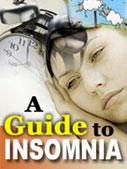Chronic Insomnia
Chronic Insomnia
Chronic insomnia differs from acute insomnia, in that chronic
insomnia often has underlying ailments that trigger sleepless nights.
Chronic insomnia may arise from asthma, mental disorders, jag leg,
arthritis, chronic back pain, and so forth. Chronic insomnia is continuing while acute
insomnia only strikes ever so often.
To give you an example of chronic insomnia we can look at a childs
history. The child each night when he lies down to rest finds it difficult and often is up
throughout the night playing games or watching movies.
The childs mind refuses to rest, thus during day hours the child
finds it difficult to concentrate. The child often explodes when a person asks him to handle
a task or becomes frustrated when a teacher jumps his bones for not doing his
homework.
The child may become more frustrated later and simply quite
school, or else attend school only when the need arises. The child during school hours may
get in repeated trouble and utilize enough time outs that eventually the child is expelled
from school.
As you can see chronic insomnia extends to problems, but it does
not stop there. Eventually, if no help is provided the child will endure physical problems,
including chest pains, nervous disorders and so forth.
Chronic insomnia can lead to heart attacks, strokes, high-blood
pressure, diabetes, and continue to death. When the mind and body does not receive the rest
it requires to function problems arise.
Since the process of deterioration of health and mental status is
prolonged, slowly working toward breakdown, help is needed immediately.
The first step to finding out what the problem is, is seeking out
medical treatment. Once the person has a physical, the doctor may determine what is causing
the problem.
If the doctor is unable to find any medical ailment that is
triggering insomnia, then mental health treatment should be the next step.
Mental disorders and ailments can cause insomnia. Many patients
that suffer Posttraumatic Stress Syndrome, Sleeping Disorders, ADHD (Attention Deficit
Hyperactivity Disorder), Schizophrenia, Psychosis, Oppositional Defiant Disorder, Impulsive
Control Disorder, OCD (Obsessive-Compulsive Disorder), or other mental disorders often suffer
insomnia.
To treat chronic insomnia the underlying sources must be treated
first. Most disorders of the mind are easily treated with medications; however, few mental
disorders may require extensive psychotherapy.
Patients with Oppositional Defiant, Schizophrenia, Psychosis, and
Obsessive-Compulsive Disorder often need ongoing treatment, with few patients suffer
Oppositional Defiant Disorder requiring ongoing psychotherapy.
For the most part the doctor will setup a strategy that will
include medications, ongoing mental health treatment, and may require the patient to setup a
schedule for dieting and exercise.
Often techniques such as visual mind strategies, musical
strategies, and other tactics will be utilized to help the patient control his or her mind,
thus helping the patient cope with stress.
Advisories should be set up for patients with Antisocial
Personality Disorders, Oppositional Defiant, Schizophrenia, Psychosis, and other major
disorders, simply because these patients will adhere to violence for reason or no reason at
all.
Thus, if the patient is constantly suffering chronic insomnia this
puts others at a higher risk, since the mind is subject to break at any giving
time.
Persons that suffer psychopathy, sociopath, histrionic
personality, antisocial disorders and other dangerous disorders will require ongoing
psychotherapy and possible inpatient care to fight off chronic insomnia and the symptoms of
the disorders.
If the problem is medical thus the doctor will determine which
medication is required to help the mind find a relax state, thus leading to restful
nights.
Symptoms of Chronic Insomnia
- Fatigue
- Nervousness
- Anxiety
- Panic attacks
- Lack of concentration
- Frustration
- Aggressiveness
- Incoherent
- Unable to cope with stress
- Hyperactivity periodically
- Restlessness
- Carelessness
- Inability to follow directions
- Tension
- Knotting of the stomach
- Aching of the muscles
- Lack of interest
If you or someone you love are showing any of these symptoms it
may be time to seek out professional help now.
|























